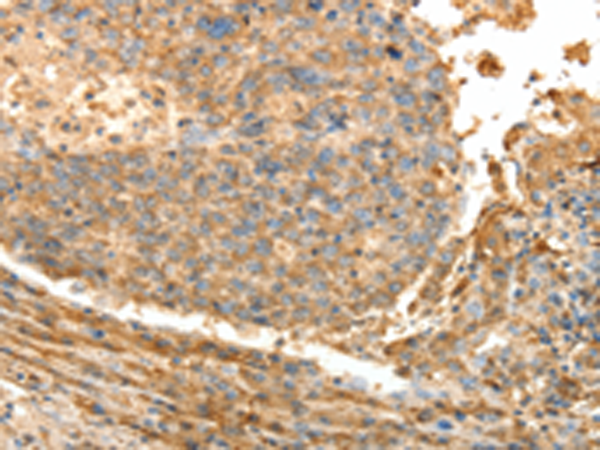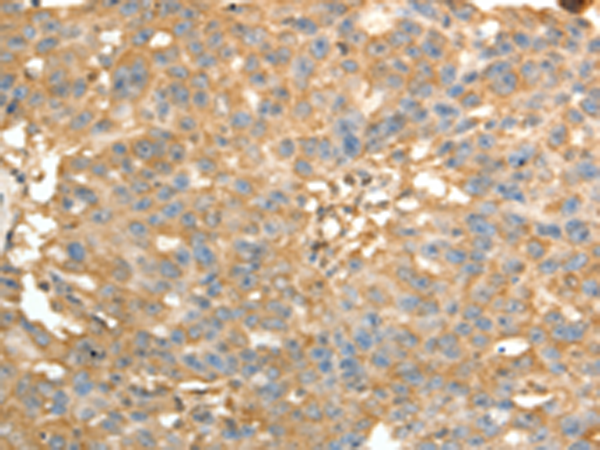


| WB | 1/500-1/2000 | Human,Mouse,Rat |
| IF | 咨询技术 | Human,Mouse,Rat |
| IHC | 1/50-1/200 | Human,Mouse,Rat |
| ICC | 技术咨询 | Human,Mouse,Rat |
| FCM | 咨询技术 | Human,Mouse,Rat |
| Elisa | 1/2000-1/5000 | Human,Mouse,Rat |
| Aliases | p27, Rpn4 |
| WB Predicted band size | 25 kDa |
| Host/Isotype | Rabbit IgG |
| Antibody Type | Primary antibody |
| Storage | Store at 4°C short term. Aliquot and store at -20°C long term. Avoid freeze/thaw cycles. |
| Species Reactivity | Human, Mouse, Rat |
| Immunogen | Fusion protein of human PSMD9 |
| Formulation | Purified antibody in PBS with 0.05% sodium azide and 50% glycerol. |
+ +
以下是关于PSMD9抗体的3篇参考文献及其摘要信息:
1. **文献名称**: *"Characterization of PSMD9 as a biomarker for hepatocellular carcinoma progression"*
**作者**: Li X, et al.
**摘要**: 研究利用PSMD9特异性抗体,通过免疫组化和Western blot分析,发现PSMD9在肝癌组织中高表达,并与患者预后不良相关,提示其可作为肝癌治疗的潜在靶点。
2. **文献名称**: *"The role of PSMD9 in regulating proteasome activity and neurodegenerative disease"*
**作者**: Tanaka K, et al.
**摘要**: 通过抗体验证,PSMD9参与蛋白酶体复合物的组装,敲低PSMD9导致蛋白酶体功能受损,可能与阿尔茨海默病中异常蛋白聚集有关。
3. **文献名称**: *"Development of a monoclonal antibody against human PSMD9 and its application in cancer diagnostics"*
**作者**: Zhang Y, et al.
**摘要**: 研究报道了一种高特异性抗PSMD9单克隆抗体的开发,验证其在乳腺癌组织中的检测灵敏度和临床应用潜力。
以上研究均涉及PSMD9抗体的实验应用,涵盖疾病机制探索及诊断工具开发。
The PSMD9 antibody is a crucial tool for studying the 26S proteasome, a large multiprotein complex responsible for targeted protein degradation in eukaryotic cells. PSMD9 (Proteasome 26S Subunit, Non-ATPase 9), also known as ASF1 or HSPC010. is a component of the 19S regulatory particle that recognizes ubiquitinated substrates and facilitates their unfolding and translocation into the proteasome’s catalytic core. This protein plays a role in maintaining cellular protein homeostasis, regulating processes like cell cycle progression, stress responses, and apoptosis.
Antibodies targeting PSMD9 are widely used in research to investigate proteasome assembly, function, and dysregulation in diseases. They enable detection of PSMD9 expression levels via techniques such as Western blotting, immunohistochemistry, and immunofluorescence. Studies utilizing these antibodies have linked PSMD9 to cancer progression, neurodegenerative disorders (e.g., Alzheimer’s disease), and autoimmune conditions, as proteasome dysfunction often underlies these pathologies.
Recent research highlights PSMD9's interaction with heat shock proteins and its potential role in modulating stress-adaptive pathways. Additionally, its overexpression in certain tumors has spurred interest in its utility as a biomarker or therapeutic target. Commercial PSMD9 antibodies are typically validated for specificity using knockout cell lines or siRNA-mediated knockdowns. Researchers must optimize experimental conditions due to the proteasome’s dynamic structure and tissue-specific expression variations.
×